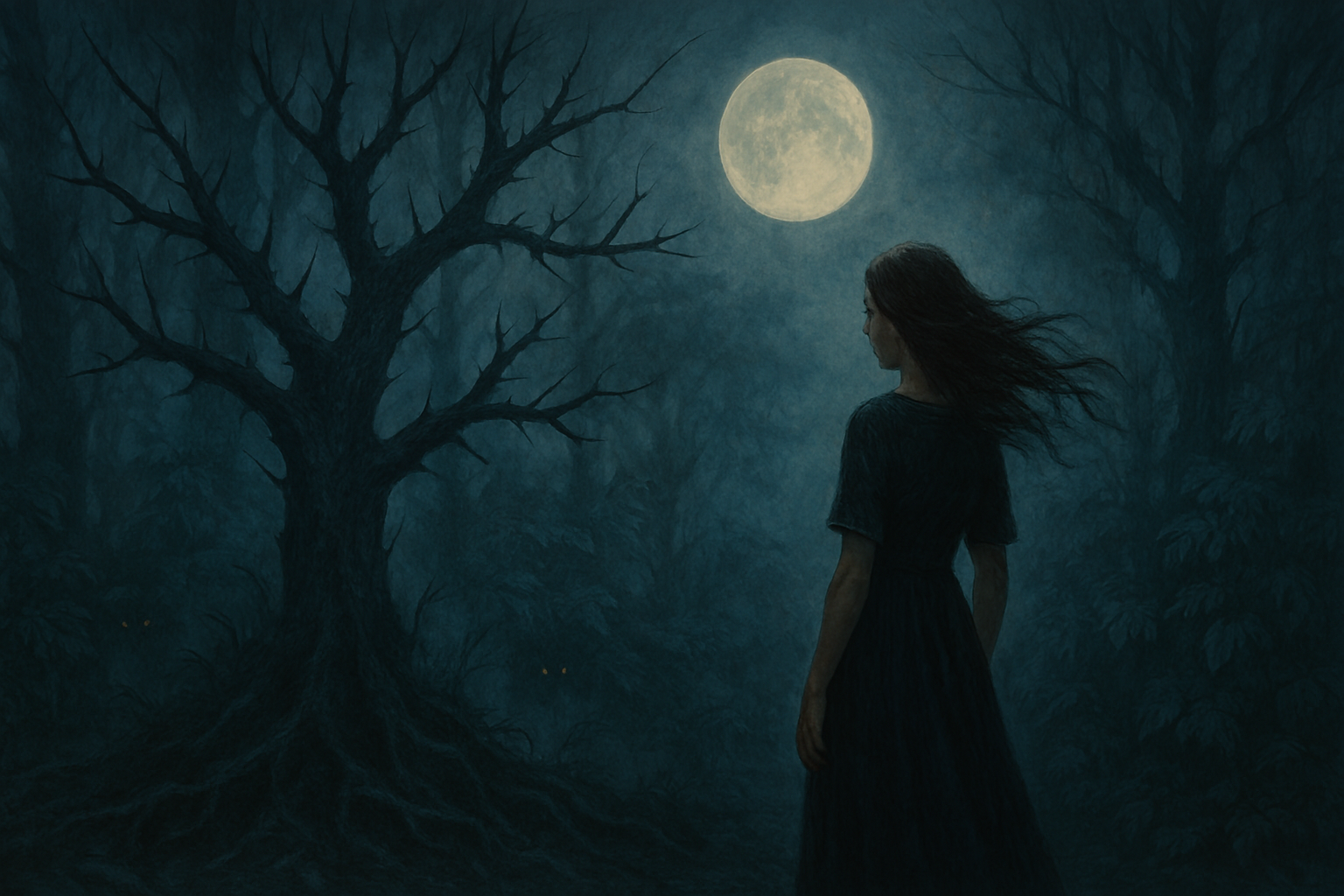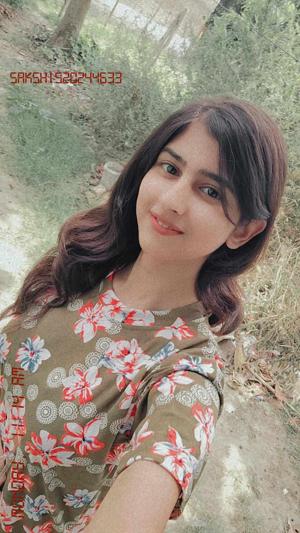
The mansion was silent in a way that hurt.
Walls that once echoed laughter now only remembered screams.
Vindhyā’s perfume still hung faintly in the corridor, like the ghost of pride refusing to fade.
Mayūrī’s dolls sat abandoned near the stairs, their eyes cracked, their silk dresses gathering dust.
Rudrā Singh stood in the middle of the hall, surrounded by everything he had loved and lost.
His breathing was shallow. His eyes…… bloodshot, sleepless. His grief had turned into something colder now, something sharp.
He lit the last of the oil lamps and stared into the flame as if it could explain why the gods had turned away.
“Sab khatam ho gaya…”
“Meri beti… meri patni…”
“Aur sab kuch us ladki ke vajah se.”
His voice trembled, then steadied with madness.
“Woh chudail… wohi saap hai jo humare vansh ko kha gayi.
Mere pita sahi the — un jaise logon ka bas ek hi ilaaj hota hai.”
His face had lost all humanity. Grief had melted into rage, and rage into something filthier revenge.
He rose, slow but certain, like a man following a whisper straight into hell.
Outside, his horse waited, breath misting in the cold. The villagers watched him from behind closed windows, whispering prayers they knew wouldn’t be heard.
Everyone knew where Rudrā Singh was going. No one dared to stop him.
Bhairavī’s villa stood silent.
Inside, only one lamp burned. Nishigandhā was folding prayer cloths, her back turned to the door. Her voice hummed an old protection mantra, soft, maternal, unaware that the very evil she prayed against was walking toward her.
The door creaked.
Boots crushed the dried herbs scattered on the floor.
She turned shocked.
“Rudra?”
His smile was wrong. His eyes, red-veined and hollow.
“Teri beti kahaan hai?” he said, voice low, almost kind.
“Usne meri patni, meri beti sab le liya. Ab main usse lene aaya hoon.”
Nishigandhā’s voice didn’t tremble. It dripped with disgust. “Tu wahi hai na jiske baap ke gunaah ka bhugtan uski beti or biwi ko karna para?”
Rudra’s jaw clenched. His eyes twitched. “Apn jabaan sambhal ke baat karo. Janti nhi ho main kaun hu?”
She laughed, low, bitter, fearless. “Jabaan sambhalun? Tere pita ne meri maa ka badan cheer diya tha aur tujhme uska khoon hai. Ab bata, kis muh se izzat ki baat karega?”
He stepped forward, rage rising like steam.
“Bhairavi toh sadhana karne gayi hai…” she said mockingly now, not as a plea but as poison.
That did it.
Rudra’s eyes turned wild. His hand lashed out, fast, brutal. The lamp toppled, spilling firelight across her face. Nishigandhā stumbled, hit the wall, coughed blood, but she still smiled.
“Maar de mujhe,” she spat, her voice hoarse but steady. “Tu wahi karega jo har kamzor mard karta hai….. jab ek aurat sach bolti hai, toh use khamosh kar deta hai.”
Rudra’s grip tightened on her hair, dragging her up so close she could smell the alcohol and fury on his breath.
“Woh teri beti nahi hai… woh mere pita ka shraap hai!”
She met his eyes — steady, even now.
“Nahi, Rudra… woh shraap nahi hai.”
Her voice softened to a whisper that felt like a prophecy.
“Woh teri maut hai.”
He hesitated, just a second, and in that heartbeat she spat blood right onto his cheek. And that’s when the beast broke loose.
Rudra’s rage exploded. He struck again and again, each hit more vicious than the last. The villa filled with the sound of bones meeting wood, of breath leaving the body. The lamp guttered and went out, plunging the room into darkness.
Only his ragged breath remained, and her blood on his hands glowed faintly in the dying firelight, crimson, sacred, unforgiving.
He stood over her corpse, panting, eyes glassy.
And for the first time, the forest went quiet. Even the wind refused to move.
Meanwhile The forest breathed around her.
Moonlight spilled through the canopy in shards, illuminating Bhairavī as she knelt on the damp earth.
Barefoot. Arms smeared in vibhūti. Oil lamps circled her like small suns, their flames flickering against the shadows of the trees.
Her hands were raw, bleeding from the friction of her palms against the cold stones.
But she did not flinch. Not once.
The chant left her lips, low, relentless.
Every syllable sank into the forest floor, into roots, into stones, into the threads of unseen creatures that slithered at her feet.
Snakes coiled lazily, unafraid, their tongues tasting the magic in the air. Her breath matched the rhythm of the forest. The wind paused. The trees leaned slightly closer, as if they were listening to her heartbeat rather than the chant.
Somewhere inside, her grandmother’s voice trembled in her mind.
“Pain is language. Learn to speak it.”
She was beyond body, beyond flesh, touching a silence that hummed with power.
But then, a flutter in her chest. A scream she did not hear. A sense, sharper than any spell, clawing at her heart: “ something is wrong. Everything is wrong.”
Her hands faltered mid-chant. The forest whispered differently now — urgent, frantic, like the roots themselves were screaming.
“Maa…?”
She tore her eyes from the circle of lamps. The intuition — that deep, unyielding pull — screamed louder.
Not the forest. Not the ritual.
Something, someone, in her bloodline was being attacked.
Without a second thought, Bhairavī rose.
Barefoot, bleeding, chanting forgotten, she ran.
Through the twisted roots, through the shadows, through the wet, cold leaves.
The forest seemed to part for her, but even the wind carried the echo of doom.
When she reached her home, Nishigandhā’s door, the air hit her like a wall.
Silence. Too heavy. Too wrong.
Bhairavī’s hands trembled as she pushed it open.
And then she saw it.
Her mother.
Lifeless.
Blood staining her clothes, the faint smell of herbs and iron hanging in the room.
The world narrowed to a single, unbearable point.
Her sādhanā, her hours of sacrifice, her pain, her mastery, meant nothing.
Nothing mattered but this.
Bhairavī fell to her knees. The forest around her seemed to recoil, and somewhere, roots shivered in anticipation.
And in that moment, the innocence that had survived fifteen years of cruelty died completely.
Bhairavī rose.
Every ounce of grief twisted into fire.
Every tear became venom.
Every heartbeat, a drum of wrath.
The hunt had begun in earnest.

Write a comment ...